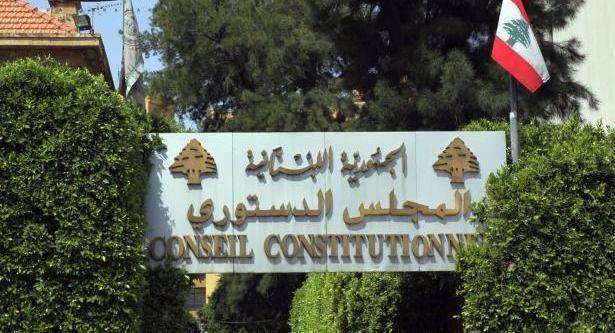
The entrance to the Constitutional Council in Beirut. (Credit: NNA)
BEIRUT — Deputies from the Strong Lebanon bloc, most of whom are affiliated with the Free Patriotic Movement, filed a demand on Wednesday to the Constitutional Council asking for the annulment of the amendments to the electoral law that went into effect on Nov. 5, claiming an “abuse of majority” and “the intervention of legislative powers into the executive branch.”
Here’s what we know:
• FPM-affiliated MP Alain Aoun called on the Constitutional Council to “assume its responsibilities” and affirmed that it is “the executive branch that decides the election date.”
• Amal-affiliated MP Ghazi Zeaiter criticized the attempt to invalidate the law, claiming that “those attempting to avoid the deadline will not reach their ends. Countries aren’t built through personal interest, disinformation and malice.”
• President Michel Aoun, founder of the FPM, said Tuesday that the annulment targets the “amendments to the law and not the law itself” and claims that it will not impact the organizational process.
• The interior minister cannot launch a call to elections before the Constitutional Council issues its decision. However, even if the March 27 date remains fixed, the interior minister can still postpone the vote.
• The annulment request claims that the vote that passed the amendments violates article 57 of the constitution by taking into consideration absolute majority with respect to the actual composition of the Parliament while the law states that the number of votes needed to reach absolute majority should not exclude deceased or resigned MPs.
• The MPs who filed the complaint also consider that the amendments to the electoral law constitute an infraction of the separation of powers by interfering in the executive branch’s decision-making role as specified in Article 66 of the constitution. Citing article 65, the demand notes that two-thirds of the government must agree on electoral law amendments.
• The removal of the prime minister and the justice minister from a joint decision with the minister of interior in the amendments was also challenged on the basis of articles 64 and 66 of the constitution.
• The complaint also claimed that the amendments to the electoral law “unlawfully interpret the constitution.”
• In addition, the complaint referenced Article 21 of the Universal Declaration of Human Rights and Article 25 of the International Covenant on Civil and Political Rights, which guarantee citizens’ rights to participation in political decision-making, thus objecting to the electoral law amendments’ purported exclusion of eligible voters. Deputies opposed to the amendments had claimed that under the new law voters would have to face difficult weather conditions and that thousands of potential voters who would reach the age of eligibility by May 8 would be excluded. Additionally, the removal of a specialized electoral district for expatriate voters was criticized as interfering with the fair representation of this portion of the electorate.
• The annulment request objects to the privation of expatriate voters of the legal representation accorded by their previous specialized electoral district, which had been allotted six MPs.
• The demand additionally claims that the new date is associated with conditions, including weather conditions, unfavorable to voter turnout.
• Another point of contention is the logistic challenges imposed by the new election date, which would shorten the time that organizing authorities (the Interior Ministry, municipalities) have to compile voter registries from 90 days to 40 days.
• The objection also included a reference to the proposed women’s quota, noting that the lack of consideration, or implementation, of this quota calls into question the “genuine desire for reform” contained in the amendments.
• The amendments to the electoral law, which moved the election date from May 8 to March 27, to avoid campaigning during Ramadan, and removed the six-seat specialized electoral district for expatriates, were approved by Parliament on Oct. 19. The amended law went into effect on Nov. 5 despite the objections from the Strong Lebanon bloc and President Michel Aoun’s refusal to ratify them.